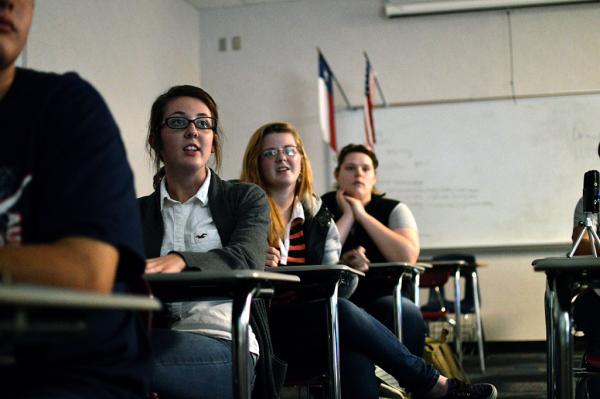Students Feel Cheated Out Of State Money For Education
Education.KERA.org October 23, 2014 31Spending on education is one of the biggest policy issues in the Texas governor’s race. We showed the Sept. 30 KERA debate to students at two different high schools in North Texas. When education spending came up, there were some strong reactions.
Greg Abbott and Wendy Davis offered different plans for funding Texas schools during the debate.
State Senator Davis wants Texas to spend more money on education. “My plan calls for investing and making sure that every 4-year-old in this state has access to quality full day pre-K, that we pay our teachers more in line with the national average,” she said.
Attorney General Abbott wants to give the districts more control over their spending. “Before we talk about the dollar amount, we need to talk about what we are providing for the students in the classroom,” he said.
Many students were bothered to hear that Texas spends thousands less per student than most other states. “We walk in to a bathroom of four stalls, and only two have working locks,” said Rebecca Trissell, a senior at Aubrey High School in rural Denton County.
“They can’t even afford to put locks on the doors, but they can afford to re-turf the football field?”
Criticizing the athletics department might seem like a cheap shot, but she wasn’t the only one concerned about how money was allocated when it comes to the football team versus bathrooms.
“There’s holes in the walls. When there’s a hole in the wall people play with it and make it bigger. If you filled it up, people would stop making holes,” said sophomore Sean Collins. And he wasn’t finished.
“The instruments in the band, the slides don’t even move. So it makes us sound worse.”
Aubrey High School is actually a beautiful campus with modern facilities–but griping about school is the teenager’s birthright.

At Polytechnic High School in Ft. Worth, the students didn’t see the football team as taking money from academics, but felt a sense of scarcity in ALL areas of their educational environment.
“We get the same books every single year. And half of them don’t even have the pages in them,” said senior Ashley Black. She said she’s heard teachers make bitter comments about this while trying to teach—“like, ‘turn to page 84, if your book even has a page 84.’”
Aubrey and polytechnic schools couldn’t be more different demographically. Aubrey students are mostly white, and above the state’s average for college readiness. Poly is in a poor, minority neighborhood, and the students test below average for college readiness.
The students at Poly were much more concerned, for example, about pre-K programs.
“My baby brother didn’t get to go to Pre-Kinder, b/c there were so many kids trying to get in. Now he’s behind,” said Keyonna Benson, a sophomore. Some of the students here have to babysit nieces, nephews or younger siblings for hours every day. Full-day pre-k helps the high schoolers as well as the little ones.
Students at both schools hoped that the state could pay their teachers better salaries.
“I agree with Wendy, I think teachers deserve a little change. It’s hard –what they’re doing is hard, and I do think what they’re doing is beneficial,” said Poly sophomore Joseph Aguwa.
The National Center for Education Statistics says the average teacher salary in the U.S. is around $56,000, but only $48,000 in Texas.
Katelyn Brewer, a senior at Aubrey, wants that gap closed.
“As a student, I love when I can see a teacher who is enthusiastic, and believes in what they’re teaching,” she said. But with tight budgets and poor pay for teachers, Katelyn said the quality of classroom instruction can get brushed aside. She lamented the times she’s been taught by “a coach who sits at a desk and says, ‘read the chapter, here’s your test.’”
Even with a wide variety of opinions from the students at the two high schools, there was unanimous agreement on one thing: everyone wants different food in the school cafeteria.
9(MDAxODQzOTgwMDEyMTcyNjI4MTAxYWQyMw004))










